War of the Scarlet and White Roses. King Henry VI
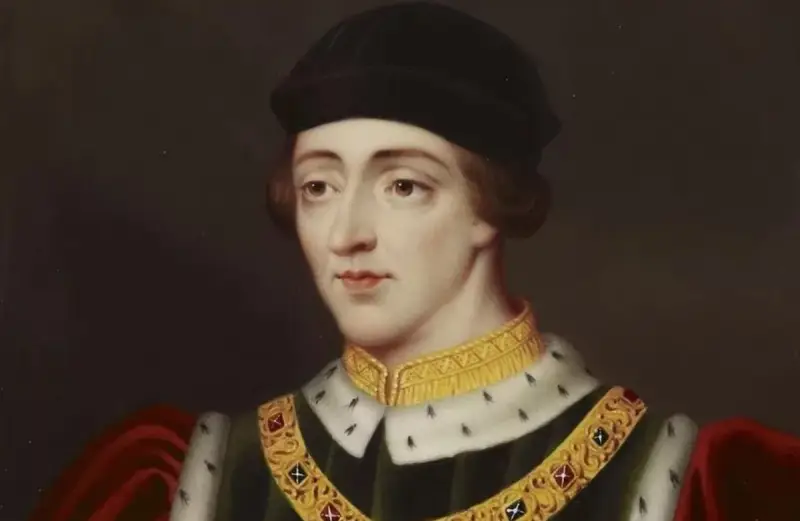
for they will be called sons of God.
Matthew's Gospel, 5: 9
History in faces. In previous materials, we talked about women who worked a lot to ensure that the War of the Roses began and then continued. And if in the previous chapter we talked about Margaret of Anjou, the wife of King Henry VI, now “the time has come for men,” and we will talk about King Henry VI and his unfortunate fate.
So, Henry VI (1421–1471).
He was born in Windsor Castle on silk sheets, as befits a royal child, and died in... the Tower, a royal prison without repentance and, at best, on a sheet made of rough canvas.
He was the third and last English king of the Lancaster dynasty. And the only one who was crowned king of England and France and actually ruled over a significant territory, and did not just bear this title. He married Margaret of Anjou, in which many see the real “finger of God.” Because he fell under her complete influence, and it was precisely this that led to the War of the Roses.
Most historians consider him a weak ruler and a narrow-minded person. Simply put, weak-minded, which is not surprising if we remember the many consanguineous marriages in the royal families of Europe at that time. However, while on the throne, he actively patronized the Church and the development of literature and art in England, and was a generous patron of the arts and benefactor, which is good in itself!
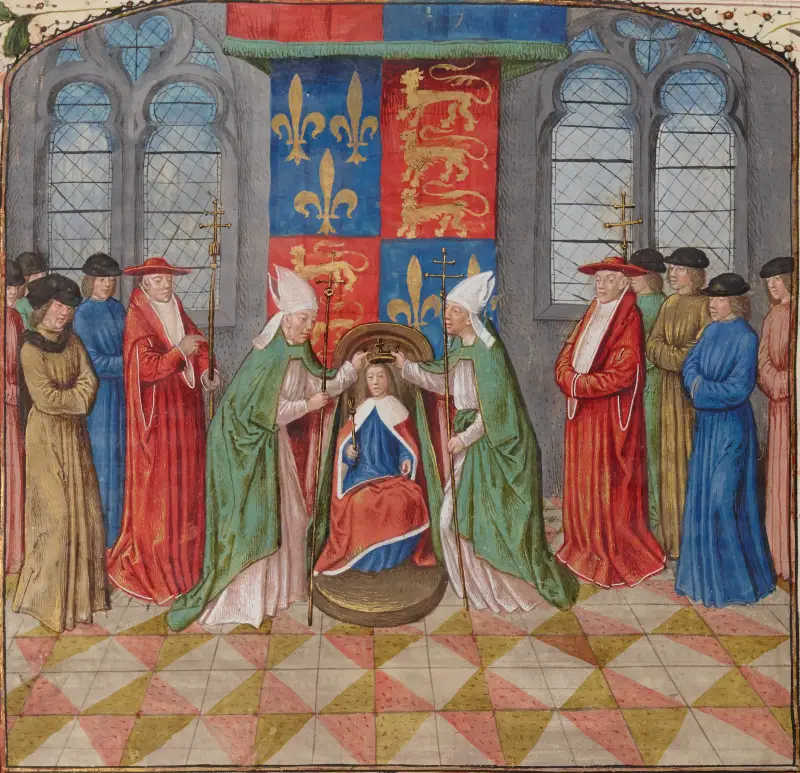
Crowning of Henry VI by the French crown (1422). Miniature from the Old English Chronicles by Jean de Wavrin. National Library of France, Paris
Since Henry became king in his youth, a parliament was convened to help him and a regency council was created, which operated until the king came of age.
Parliament appointed John, Duke of Bedford, as chief regent, who took up the affairs of the kingdom in France. His deputy in England was his younger brother, Humphrey, Duke of Gloucester, “Support and Support of the Kingdom.” Bishop Henry Beaufort (cardinal from 1426), uncle of Henry V, also played a major role in this council. And from 1428, the Earl of Warwick, an active oppositionist to the power of Richard II, became the mentor of the young king.
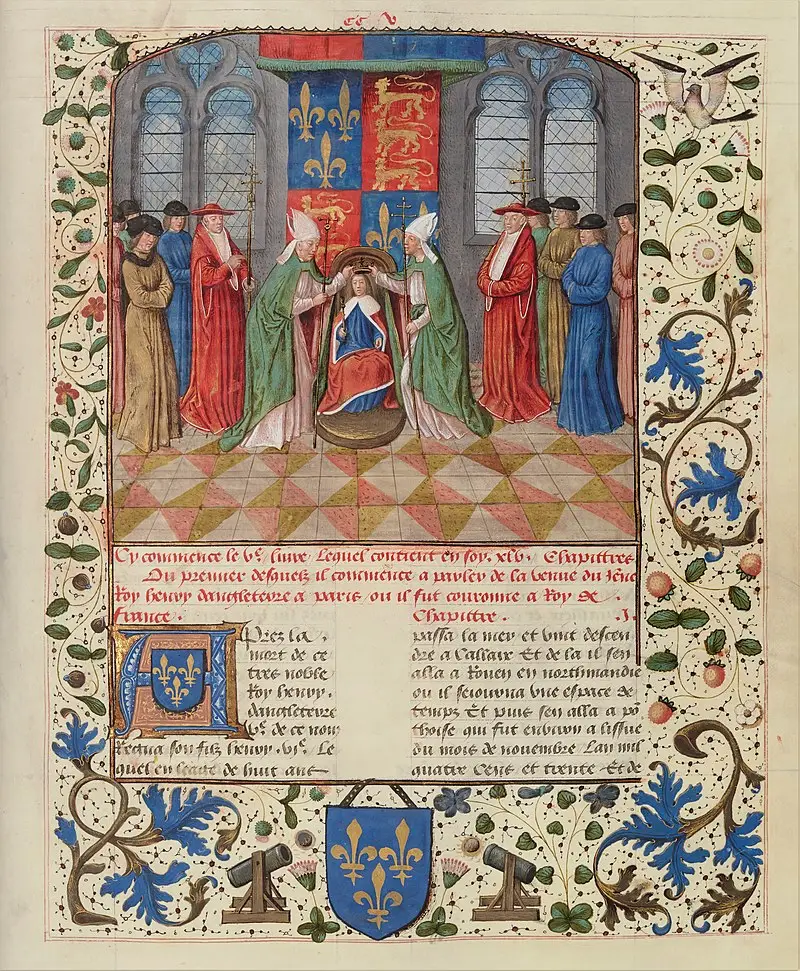
The same plot, but on the entire page of the book. Moreover, the latter is decorated with a coat of arms with lilies and two... mortars of that time!
Henry also had two half-brothers: Edmund and Jasper, who were his mother’s children from Owen Tudor, with whom she married for the second time. And it was Edmund Tudor who became the father of Henry Tudor, who was destined to become King Henry VII and become the founder of a new dynasty.
Interestingly, Henry VI was crowned twice. The first time was in Westminster Abbey by the crown of England in 1429, and the second time was in Notre Dame Cathedral by the crown of France in 1431!
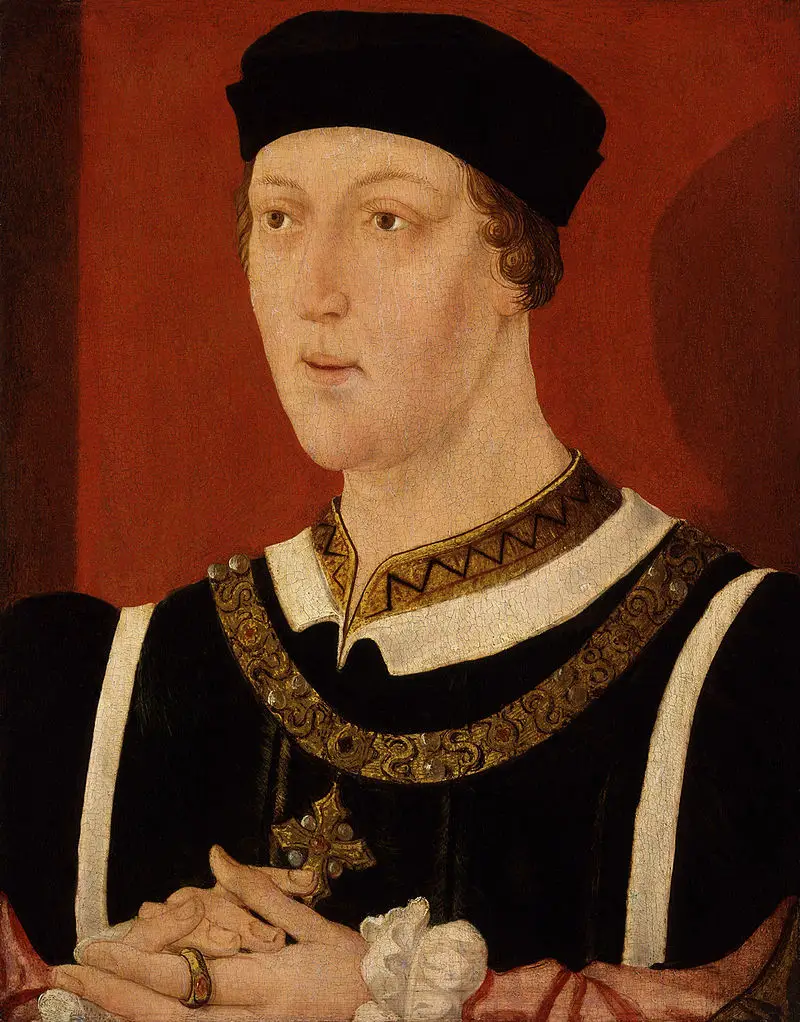
Henry VI in his youth. Unknown artist. OK. 1540 National Portrait Gallery, London
In 1437, Henry came of age and began to rule himself. The main problem of the reign was resolving the issue of war and peace with France, and the king himself advocated peace. But there was also a “party to continue” the war at his court, and it was very powerful. And so, in order to resist her, Cardinal Beaufort and the Earl of Suffolk managed to convince the king that it was his marriage with Margaret of Anjou that would bring peace and prosperity to both countries.
In addition, Henry’s ears were all buzzing about how amazingly beautiful she was. And they decided that her father would not give her a dowry in the form of lands, but would himself receive Anjou and Maine from England. Needless to say, such an agreement in England caused a wave of indignation - “land for a woman, even a beautiful one!” Henry and Margaret.
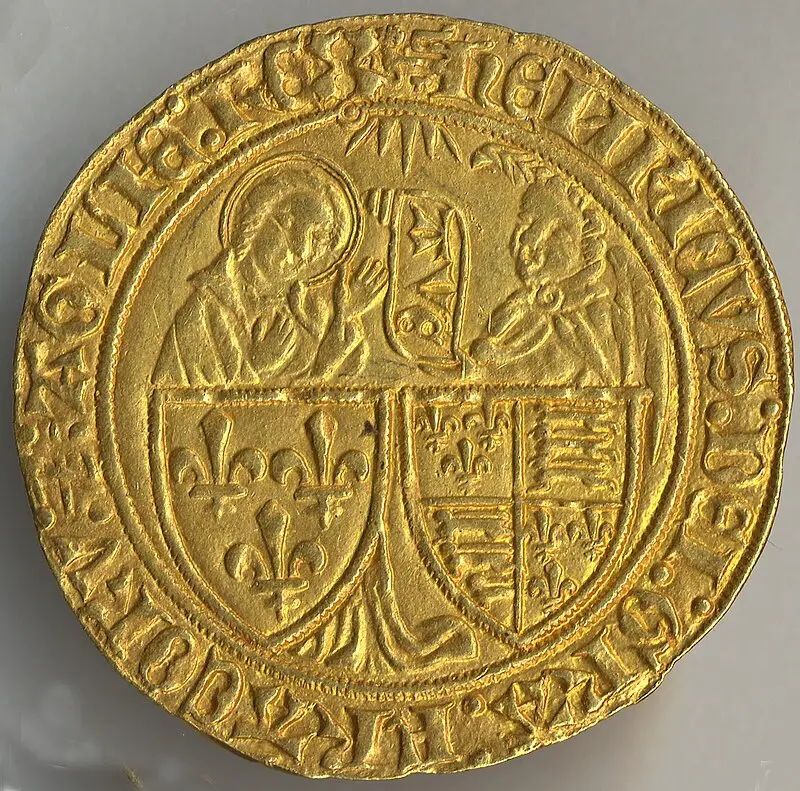
Quarter of a gold noble. Metropolitan Museum of Art, New York
In 1447, the Earl of Suffolk decided to get even with his accusers from the “war party”, and together with Cardinal Beaufort and his nephew Edmund Beaufort, Earl of Somerset, they managed to get the king and queen to bring the Duke of Gloucester to trial for treason, expressed in his incompetent leadership campaign in France.
But they did not have time to condemn him, as he suddenly died. This is why rumors immediately spread that he was killed on the orders of the vengeful Queen Margarita. But the Earls of Suffolk and Somerset immediately became dukes, and Somerset was sent to fight in France.
All these actions of the young royal couple did not increase her popularity among the people. And the Duke of Somerset turned out to be a clever courtier, but a useless commander, and in 1450 he lost Normandy in France. There was no money in the treasury and soldiers returning from the war did not receive salaries, which led to unrest. French pirates attacked the English coast...
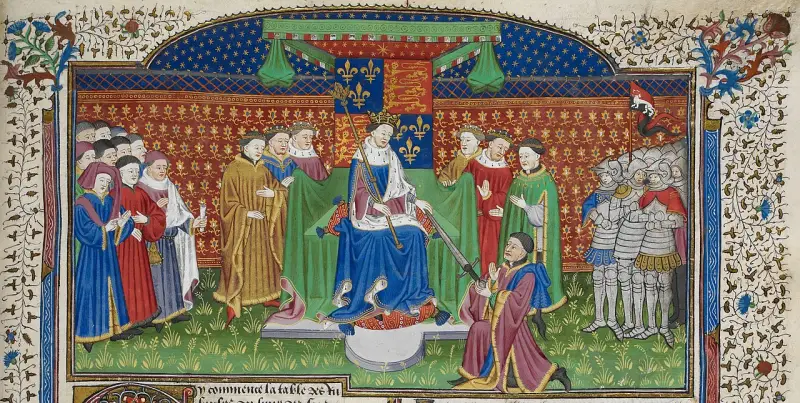
Henry VI presents the sword to the Earl of Shrewsbury (John Talbot), appointing him constable of France. British Library, London
As soon as news of the defeat of the English army at the Battle of Formigny reached England, the uprising of Jack Cad, an impostor who posed as John Mortimer, the bastard of Earl Edmund March, began in Kent. The rebels managed to defeat the royal troops and even capture London.
And although Cad was mortally wounded by an arrow and died on the way to execution, and the rebels themselves were defeated, individual peasant detachments continued to resist the authorities until 1454, so strong was the dissatisfaction in the country with the current situation. And no wonder, because in 1453 the British were again defeated in the Battle of Castillon, which not only led to the end of the Hundred Years War, which, in general, everyone was happy about, but also to the loss by the English crown of all lands in France, except the one and only port of Calais.
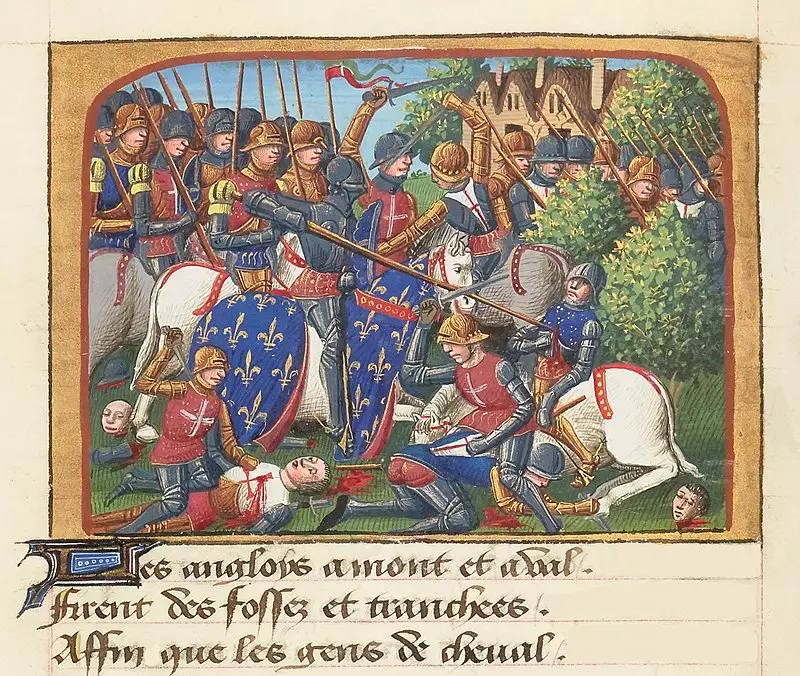
Battle of Formigny. Miniature of the manuscript “Vigilium on the Death of King Charles VII.” XV century. National Library of France, Paris
Here, in 1452, the Duke of York returned from Ireland (sent there before the king came of age and had certain rights to the throne) and demanded a position at court. But most importantly, he stated that he wanted to rid the king of “bad advisers.”
Soon he gathered an army and... moved towards London, and his opponents also gathered an army and moved towards him.
True, there was no battle. The Duke presented his demands to the crown, and the king was determined to satisfy them, but then his wife intervened in his affairs, and in the end everything was done according to her wishes. However, she soon gave the king an heir - Edward of Westminster, whom she gave birth to in 1453, and this made the king incredibly happy!
However, he was not happy for long. Upon learning of the loss of Bordeaux, Henry experienced a severe mental shock and practically dropped out of life for a whole year. Modern researchers believe that he could have suffered from schizophrenia, and no wonder, because his maternal grandfather was Card VI the Mad.
As a result, the Duke of York was proclaimed ruler of the kingdom, and Edmund Beaufort was imprisoned in the Tower on charges of treason, and only with great difficulty did he manage to save his head from the chopping block.
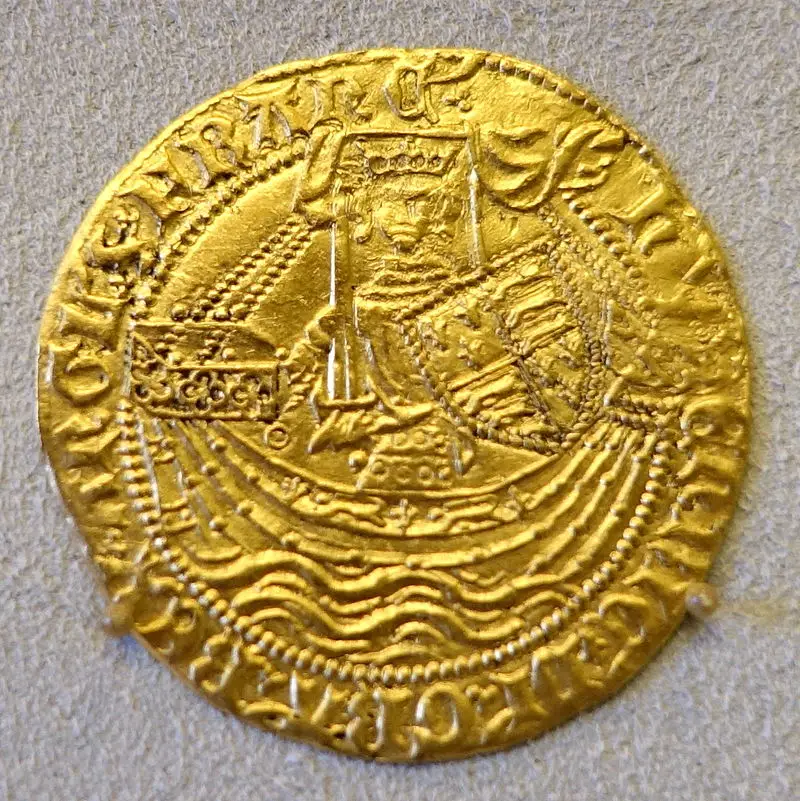
Full of Henry VI. Bode Museum, Berlin
But then, at the end of 1454, Henry VI suddenly regained consciousness, and all the Yorks’ hopes for power vanished like smoke. All that remained was to take it by force, and the Duke again began to gather troops.
Thus began the War of the Roses, but its official beginning is considered to be the following year, 1455, in which the Battle of St. Albans took place.
Then in 1460, after defeating the royal troops at Northampton, the Duke of York even entered London and declared himself heir to the throne of England, bypassing the legal heir Edward of Westminster.
But then a woman again intervened in the fate of England, and again it was Margaret of Anjou. She gathered troops loyal to the House of Lancaster, and at the Battle of Wakefield she defeated the army of the Duke of York, and he himself was killed in this battle!
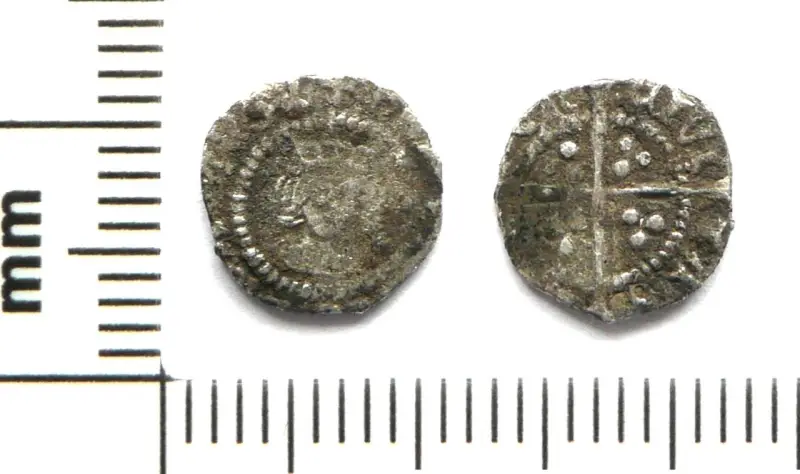
Silver farthing of Henry VI. British Museum, London
However, he had three whole sons, and all of them, through their father, also had rights to the throne!
In 1461, the Battle of Taunton took place, in which all three brothers fought side by side and won a decisive victory over the Yorkists. After this, Richard of York's eldest son became king under the name Edward IV.
Queen Margaret fled with her son Edward, first to Scotland, then to Wales, then to France, where she began to gather a new army. The king hid with friends in Lancashire and Westmoreland, but was eventually betrayed to his enemies by some monk. In July 1465, Henry was captured, brought to London and traditionally imprisoned in the Tower.
Richard Neville, 16th Earl of Warwick, nicknamed the “kingmaker” for his activity in this field, provided great assistance to Edward in becoming king. But he wanted gratitude from the king he created, and he understood it in his own way, but the young king... differently, and on this basis they quarreled very strongly. And so much so that in 1470 Neville went over to the side of Henry VI, or rather his wife, Queen Margaret.
And happiness smiled on all three: in October of the same 1470, Henry VI, through the efforts of Warwick, was released from prison and again received the crown, his wife returned from France and became queen. Well, he, Earl of Warwick, was satisfied with his revenge on the ungrateful Edward and began to wait for rewards from the new rulers, especially since he himself was now in charge of all affairs in the kingdom, and Henry was simply sitting on the throne.
And Warwick got his way...
In the spring of 1471, King Edward IV, who remained the king of England for many, managed to gather an army, returned to England and completely defeated the Lancastrians at the Battle of Barnet. Moreover, the Earl of Warwick himself died in the same battle.
The second army, which was led to the aid of Warwick by Queen Margaret of Anjou along with her son Edward of Westminster, was defeated by Edward in the battle of Tewcosbury. The only son and heir of Henry VI, Edward of Westminster, according to one version, died in battle, according to another - he was captured and killed later.
Once again, Henry’s place of stay was the Tower of London, where he died on the night of May 21, 1471. The official chronicle, naturally favorable to Edward IV, reports that Henry "died of melancholy" into which he fell upon learning of the Battle of Tewkesbury, the defeat of his beloved wife and the death of his son.
A less favorable version, however, says that King Edward IV, crowned for the second time, personally gave the order to kill him the morning after Henry’s death.
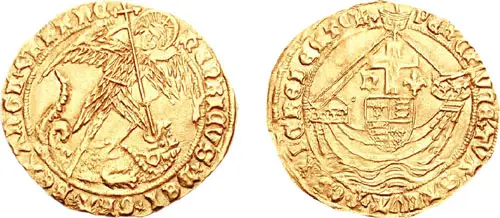
A gold "angel" minted in 1470 to celebrate the return of Henry VI to the throne. Andrew Wein Collection
According to the History of Richard III, written by Thomas More, Henry was killed by Edward IV's younger brother Richard (the future King Richard III). True, there is a source that says that Richard was not in London on the day of Henry’s death, but this does not prove anything.
The king's third brother could easily give any order that would be carried out at any distance!
The body of Henry VI was first buried in Chertsey Abbey, but then in 1484, on the orders of the same Richard, who had already become King Richard III, it was transferred to St. George's Chapel at Windsor Castle.
What it was: a tribute to the deposed king or a consolation to the pangs of conscience, we will never know!
To be continued ...
Information